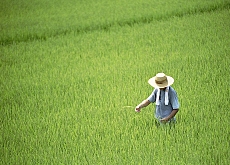Syngenta looks to biotechnology

Swiss agrochemical giant Syngenta is one of the leaders in the development of biotechnology in agriculture.
But claims that its products will help combat hunger around the world or improve people’s health are hotly contested even in its own backyard.
Syngenta has become a force to be reckoned with in the five years since it was created by the merger of Novartis’ and AstraZeneca’s crop businesses. It is the world leader in crop protection and number three in the commercial seeds market.
One of its apprentices made headlines recently in Switzerland with her development of a new super-potato resistant to potato blight, the scourge that led to Ireland’s Great Famine in the 1840s.
But this plant was the result of traditional crossbreeding of different potato varieties. Syngenta is increasingly considering the benefits of biotechnology as a way of boosting its bottom line.
The company believes genetically modified organisms (GMOs) can offer significant benefits to customers, growers, industry and consumers, and make farming more sustainable.
Distrust
But Syngenta’s plans have met with opposition at home. In Switzerland, the use of GM technology was dealt a setback in 2005 when voters accepted a moratorium on its use in agriculture despite warnings from researchers, the business community and the government that accepting the moratorium would lead to the loss of jobs.
The security of GM plant field tests has also been hotly debated, and consumers have shown little interest in purchasing products containing GM-sourced material.
Claims made by agrochemical firms that GMOs will help stave off hunger because these crops are most resistant to disease and pests are also met with distrust.
Non-governmental organisations such as Greenpeace reckon the solution to fighting hunger lies not with producing more food, but with improving access and ensuring better social conditions in the developing world.
Swiss agricultural specialist Hans Rudolf Herren, the head of the Washington-based Millennium Institute, agrees.
“We have to see if there is real need for these crop varieties,” he told swissinfo. “The real constraints are elsewhere, such as soil fertility or the agronomic system.”
Create monopolies?
NGOs say that companies like Syngenta are only interested in improving their bottom line with GM technology, and if possible, in creating monopolies in the conventional and genetically modified seed markets.
Clement Tolusso of Greenpeace Switzerland says there is nothing wrong with Syngenta doing business, but it should not have a stranglehold on markets via patents on living organisms.
“Syngenta is trying to hold the largest number of patents in its field,” he said.
The company rejects such claims.
Syngenta spokesman Guy Wolff told swissinfo that accusations like this are wide of the mark. “Syngenta is a strong supporter of competition and does not own a single patent that could give the company any monopoly,” he said.
Rice, the main source of food for more than half the world’s population, has been a prime target according to NGOs.
The Swiss firm has given a humanitarian bent to at least one of its endeavours. It is testing a variety of rice developed by researchers at Zurich’s Federal Institute of Technology.
Golden Rice, as it is called, has the ability to produce beta-carotene – which the body converts into vitamin A – and to increase iron content. In Asia, where rice is the main food for millions of people, vitamin A and iron deficiency is a serious problem.
These essential dietary components are found in animal products, fruits and vegetables, which are not always available to poor families.
Development project
A lack of these nutrients can cause anaemia, loss of vision or a weakened immune system and contributes to the high rate of mortality and illness among women and children in developing countries.
For Syngenta, this is a development project. According to the Golden Rice Humanitarian Board, the aim is to help prevent blindness of around 500,000 infants a year through offering more vitamin A in their diets.
But Tolusso says there is little to back such claims. “According to the UN’s Food and Agriculture Organization’s own standards, you would have to eat nine kilos of golden rice per day to get any measurable health benefit,” he said.
Syngenta says people should wait before criticising. “We will only know about the practical benefits once Golden Rice is available for public use,” Wolff said. “Today’s research results look very promising.”
In the meantime, the company is looking at other ways of promoting GM technology. With petrol prices skyrocketing, its next big market could be biofuels: energy drawn from plants.
swissinfo, Scott Capper
Genetic engineering is the process of changing the genetic makeup of a particular organism, such as a plant, to alter its characteristics or behaviour.
In agriculture, this process aims to give crops improved characteristics such as higher yield, better nutritional values, resistance against insect pests and diseases, and enhanced food-processing qualities.
GM varieties of cotton, maize and soya are already sold in countries including China, India, South Africa and Brazil, and crop surfaces exceed 90 million hectares – nearly 22 times the size of Switzerland – in 21 countries.
But concerns have been raised about the potential impact of GM crops on both the health of those who consume them and the environment.
Syngenta’s sales were $8.1 billion in 2005.
Net income was $779 million.
The company invested $822 million in research and development.
Syngenta employs 19,000 people around the world, including 4,000 in R&D.

In compliance with the JTI standards
More: SWI swissinfo.ch certified by the Journalism Trust Initiative









You can find an overview of ongoing debates with our journalists here . Please join us!
If you want to start a conversation about a topic raised in this article or want to report factual errors, email us at english@swissinfo.ch.